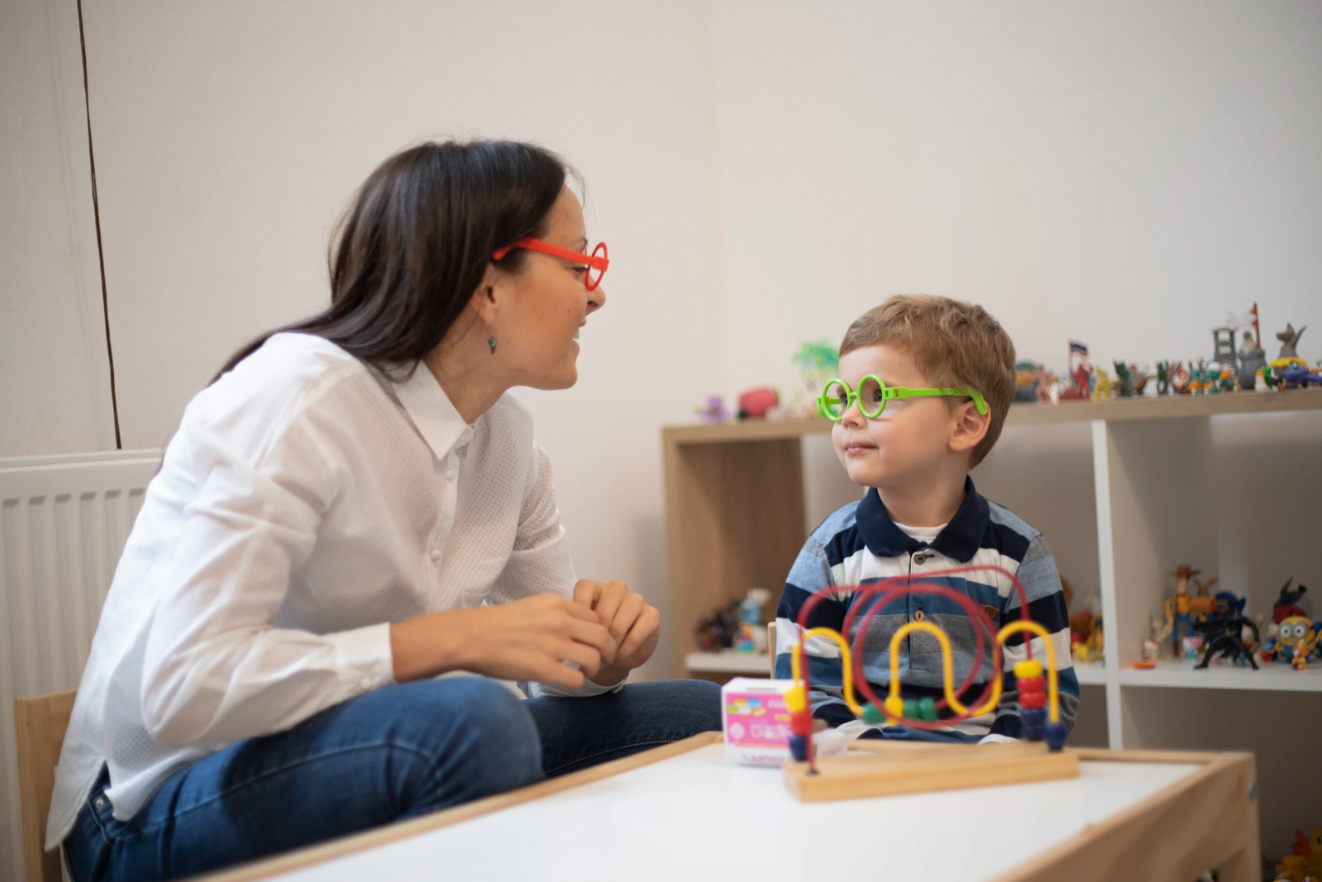Recognising Early Signs of Autism in Toddlers and Babies

Are you a parent or caregiver of a young child and concerned about the early signs of autism? Recognising early signs of autism in toddlers and babies is crucial for your family can get help and support as early as possible.
In this article, we’ll provide you with valuable insights from James Hunt, a writer on autism and dad to two amazing autistic boys. You'll get practical, first-hand experience to help you understand autism spectrum disorder, as well as information about monitor developmental milestones, and identify early warning signs.
Understanding Autism Spectrum Disorder

Autism spectrum disorder (ASD) is a complex developmental condition. The signs of an ASD can appear in infancy (as early as 4-6 months), but are more obviously seen in early childhood. Autism affects various areas of development including speech, social interaction, and behaviour. Symptoms can range from mild to severe, and each individual with ASD is unique in their presentation and abilities.
We don't know exactly what causes autism. There is research to suggest genetics and environmental factors contribute to the development of autism spectrum disorders, but a single cause has yet to be found.
Providing timely intervention and support through early diagnosis can have a long-lasting positive impact on a child’s symptoms and future abilities. Routine developmental screenings for all children are recommended by the American Academy of Paediatrics. Specific screenings for autism should be done at 18 and 24 months of age.
Monitoring Developmental Milestones

Parents should pay close attention to their child’s developmental milestones, as early signs of autism can be identified in areas such as social development, communication skills, and fine motor skills. Keeping a keen eye on these milestones enables early detection and intervention, leading to better outcomes for children with autism.
Screening for autism in children should be included in well-child appointments at 18 and 24 months. Early detection is key to providing successful treatment or interventions. If concerns about a child’s development arise, it is important for parents to contact their child’s doctor.
You should remember that children's early development varies a lot. Rather than one individual sign it is the patterns of symptoms and development over time that give the best indicator as to a diagnosis of autism. With that in mind it's not always possible to make a diagnosis straight away, sometimes it can take months or even years to be sure.
Social Development
Social development significantly contributes to a child’s overall growth and can be indicative of early signs of autism. Typical social development milestones include forming connections with caregivers, expressing emotions, responding to social cues, and engaging in play with others. In children with Autism Spectrum Disorder (ASD), social development may differ significantly from their neurotypical peers, with impairments in social interaction and communication skills, such as difficulty with eye contact, understanding social cues, and engaging in reciprocal conversations.
Parents can support their child’s social development by:
Creating structured social opportunities
Children who may have autism often need support when it comes to socialising. This can mean giving a warning beforehand, something like 'we're going to go to the park now, there will be other children playing there.' Additionally it can be very helpful to indicate that they have a choice and can leave if they feel overwhelmed, so something like 'we can leave any time you need.'
Specific games or other structured activity (lego clubs or story time at local libraries) can help children understand their role and place and make social interactions easier for children with symptoms of autism.
Using visual aids
Visual aids to show literal examples of emotions can be helpful, as well as more traditional visual cues to support language development. Try to make these as realistic as possible - so showing real pictures rather than cartoons or drawings.
Explicitly teaching social skills
To you it may be obvious but explicitly teaching things like facial expression can be very helpful. In the above example saying something like 'Smile, smile means happy' can help make this very clear.
Boosting communication skills
You may select a small 3 or 4 words to focus on and ensure these are repeated regularly. These can be items that you know your little one has an interest in or are a particular need for him. For example you might choose his favourite toys and clothes or food items.
Early intervention and support can help children with autism improve their social skills, mental health, and form meaningful relationships.
Communication Skills
Communication skills represent another significant aspect of a child’s development, and delays or difficulties in speech, language, and nonverbal communication can serve as early warning signs of autism. Typically developing children follow a series of communication milestones, such as babbling at 6-9 months, uttering simple words at 12 months, and engaging in back-and-forth conversations with more complex sentences at 3-4 years old, all crucial for a child’s development.
In children with ASD, communication development may progress differently and at a slower rate. They may experience difficulties with both verbal and nonverbal communication, such as understanding nonverbal cues and maintaining eye contact.
Recognising communication delays or challenges in children at an early stage can help parents and caregivers take action and access early intervention services, leading to better outcomes for children with autism.
Fine Motor Skills
Fine motor skills, which are significant for daily living skills and academic tasks, involve intricate hand and finger movements. Unusual or delayed development of fine motor skills, such as grasping objects or using utensils, may serve as an early indicator of autism.
Children with ASD may experience difficulty with the development of fine motor skills. Research has shown that they may struggle with activities that require precise movements, such as buttoning clothes or writing. By closely monitoring fine motor skills development, parents can identify potential early signs of autism and seek appropriate interventions.
Early Warning Signs of Autism

Some early warning signs of autism in infants and toddlers include:
Lack of eye contact
Not responding to their name by 12 months
Difficulty in babbling back and forth
Displaying facial expressions or gestures that do not align with the surrounding environment
Unusual reactions or heightened sensitivity to certain sounds, sights, or textures
These signs can be indicative of an autism diagnosis.
Identifying these early warning signs enables parents and caregivers to take suitable measures, leading to better support and outcomes for children with autism. It is essential to consult a specialist, such as a child psychologist, for a comprehensive evaluation if there are concerns about a child’s development.
Lack of Eye Contact

Difficulty establishing and maintaining eye contact with caregivers can be an early sign of autism in infants and toddlers. This may indicate challenges in social interaction and communication skills, which are key aspects of a child’s overall development.
Acknowledging and taking action on a lack of eye contact at an early stage can assist in the detection and treatment of autism in infants and toddlers. Parents and caregivers can access early intervention services, consult their child’s pediatrician, and utilise resources for support.
Delayed Speech and Language

Children with autism may experience delays in speech and language development, as well as challenges in understanding and using nonverbal communication. Early warning signs of autism related to communication skills include delays in speech and language development, and difficulties in comprehending and employing nonverbal communication.
Early diagnosis and intervention can assist children with autism in achieving their utmost potential and living a more autonomous life. Children with autism can better express their needs and emotions when the development of their communication skills is encouraged and supported.
Repetitive Behaviours

Unusual repetitive behaviours, such as hand flapping or spinning objects, can be an early sign of autism in children. Children with autism may also display an intense focus or attachment to objects that are atypical for their age.
Recognising these early signs of autism can help parents and caregivers take appropriate action and seek early intervention services, leading to improved outcomes for children with autism. Early intervention can help shape neural pathways and improve cognitive function, ultimately resulting in better outcomes for individuals with autism.
How Parents Can Take Action
First and foremost you should trust instincts; if you are worried your child is showing early signs of autism get medical advice, consult your doctor or paediatrician. Early intervention services are available that offer specialised therapeutic programs and interventions designed to support children with autism spectrum disorder (ASD) from a young age.
Parents can ensure that their child receives the needed support to reach their full potential by acting promptly. Early diagnosis and intervention can lead to improved communication skills, social interaction, and overall development for children with autism.
Trust Your Instincts
In the early detection of autism, parental instinct plays a vital role. Parents are typically the first to observe any unusual behaviours or developmental delays in their child. Relying on their instincts and seeking professional evaluation can result in early intervention and support, which is essential for enhancing outcomes for children with autism.
If parents suspect their child may have autism and the child is under 3 years old, it is recommended that their child be referred to their state’s Early Intervention program. This program provides specialist support and services for infants and toddlers with disabilities, helping them achieve the best possible outcomes.
Consult Your Child's Paediatrician
Parents should consult their child’s doctor if they have concerns about the child’s development, who can provide guidance and suggest further evaluation if necessary. Pediatricians can perform evaluations such as the Autism Diagnostic Observation Schedule (ADOS) or the Brief Observation of Symptoms of Autism (BOSA) to detect symptoms of autism.
If a child is over 3 years old, it is recommended that they be evaluated and, if appropriate, enrolled in the special education services offered by their school. These services can provide additional support to older children with autism, helping them achieve their fullest potential.
Seek Early Intervention Services

Early intervention services, such as speech, occupational, and behavioral therapy, can have a significant impact on a child’s development and long-term outcomes. These services are designed to support children with autism spectrum disorder (ASD) from a young age, helping them achieve their utmost potential and live a more autonomous life.
Children with autism can benefit from early intervention services that address their specific needs and challenges. These services can include:
Family education and support
Speech therapy
Hearing impairment services
Physical therapy
Nutrition services (dietician)
The Importance of Early Diagnosis

Improved outcomes and better support for children and their families can be achieved with early diagnosis and intervention for autism. Autism can be reliably diagnosed as early as two years of age, and research has demonstrated that early interventions in autism spectrum disorder (ASD) can lead to considerable improvements in daily living skills, social behaviour, and overall development. With autism diagnosed at an early stage, the potential for positive outcomes increases significantly.
Delays in diagnosis and intervention can result in the progression of symptoms, thus emphasising the need for early diagnosis and disease control for effective management and support. Moreover, early intervention helps shape neural pathways and improve cognitive function, ultimately resulting in better outcomes for people with autism.
Debunking Autism Myths

Common myths about autism, such as the belief that vaccines cause autism, have been debunked by scientific research. The myth that vaccines cause autism is purported to have originated from a study published in 1998 by Andrew Wakefield in The Lancet. However, subsequent research has refuted this claim and numerous studies have failed to demonstrate any connection between vaccines and autism.
Beliefs about autism have evolved over time, and it is now acknowledged as a spectrum disorder and part of a general neurodivergence, which is way more common than once thought.
Diagnostic techniques have also altered, resulting in a more comprehensive understanding of autism. By debunking these myths, we can better support and understand individuals with autism spectrum disorder.
Supporting Your Child's Growth and Development

By creating a structured environment, parents can support their child’s growth and development, encouraging social interaction, and fostering communication skills. These strategies can help children with autism improve their social skills, form meaningful relationships, and better express their needs and emotions.
Parents can ensure that their child receives the needed support to reach their full potential by actively participating in the child’s development. Early diagnosis and intervention can lead to improved communication skills, social interaction, and overall development for children with autism.
Creating a Structured Environment

Providing a structured and predictable environment can help children with autism feel more comfortable and secure. Here are some strategies to create a structured environment:
Establish a consistent wake-up time and bedtime.
Plan the day with activities and tasks that your child finds pleasurable.
Create a schedule or visual aids to offer a distinct structure and expectations for each task.
By implementing these strategies, you can create a structured environment that supports your child with autism.
Creating a structured environment can also assist children with autism in understanding expectations and developing skills to manage changes. Visual supports such as calendars, checklists, and visual schedules may be utilised to assist children with autism in comprehending expectations while providing a sense of security.
Encouraging Social Interaction

Children with autism can enhance their social skills and understanding of social cues through engagement in social activities and play. Examples of activities that can help children with autism cultivate social interaction skills and sensory awareness include:
Staring contests
Face games
Name games
Board games
Observing others’ emotions
Playing catch
By promoting social interaction, parents can help children with autism develop important social skills and form meaningful relationships. Encouraging social interaction can also enhance children’s overall development and well-being.
Fostering Communication Skills

Children with autism can better express their needs and emotions when the development of their communication skills is encouraged and supported. Speech and language therapy can facilitate children with autism in improving their communication skills by addressing difficulties related to:
Language development
Verbal and nonverbal communication
Social interaction
Understanding and using gestures
Expressing emotions and needs
In addition to professional services, parents can play a crucial role in fostering communication skills in their child with autism by engaging in activities that promote verbal and nonverbal communication, such as storytelling, role-playing, and practicing facial expressions and gestures.
Resources for Parents and Caregivers
Parents and caregivers have access to various resources to better understand and support children with autism, including educational materials, support groups, and professional services. Reputable online platforms that provide educational materials on autism include Autism Speaks, Autism Toolbox, and Sensory Kid.
Professional services that could assist parents and caregivers of children with autism include:
Family support programs
Autism support organisations
Behavioural services
Caregiver skills training programs
By accessing these resources, parents and caregivers can ensure that their child, as well as other children, receives the support they need to thrive.
Where Can I Get More Information About Autism?
You can definitely feel lonely as a parent on your journey with a child with autism. But there is actually lots of support out there if you know where to look. Here are just a few of the charities and organisations offering support for families affected by autism spectrum disorders.
Autism Speaks is dedicated to promoting solutions for individuals with autism and their families by advocating for research, support, and awareness to improve lives and advance understanding of autism.
National Autism Association focuses on raising awareness, providing resources, and advocating for a safe and secure environment for individuals with autism.
Autism Research Institute (ARI) is committed to understanding and addressing the biological aspects of autism through research and provides valuable information and resources for individuals and families.
The Arc is dedicated to advocating for and supporting individuals with intellectual and developmental disabilities, including autism, to ensure they have the opportunity to live full and independent lives.
National Autistic Society UK offers support, education, and advocacy for people with autism and their families, working towards building a more inclusive and understanding society.
Autism Science Foundation supports research to better understand autism, its causes, and effective treatments to improve the lives of those affected by autism.
Autism One focuses on education and support for individuals and families affected by autism, offering a variety of resources and information.
Autism Network International (ANI) is an organisation created by and for individuals with autism, providing a community and resources for self-advocacy and understanding.
Global Autism Project strives to provide training, support, and resources to communities worldwide, with a focus on ensuring individuals with autism have access to quality services and support.
Take Homes
Toddlers and babies develop at very different rates and ways. The signs of autism can be subtle and don't necessarily indicate a diagnosis.
Early intervention can help children with autism develop their social skills, communication abilities, fine motor skills, eye contact, speech & language capabilities.
As a parent you should trust your instincts when suspecting autism and seek early intervention services to support your little one and help them maximise their potential.
Conventional childcare settings like nurseries and daycare can be hard for families affected by autism. Poppet can help by offering unique, enriching and home-based childcare options that actually work for your family. Find caregivers and other families with experience support children with autism. Join our waitlist here if you'd like to learn more.

